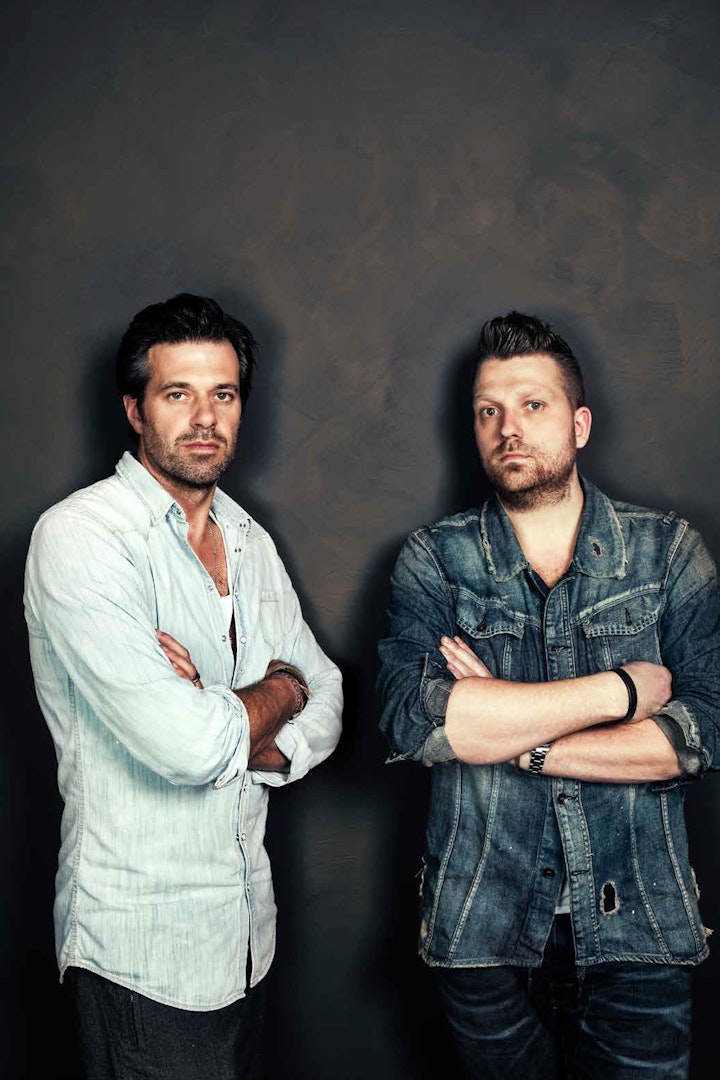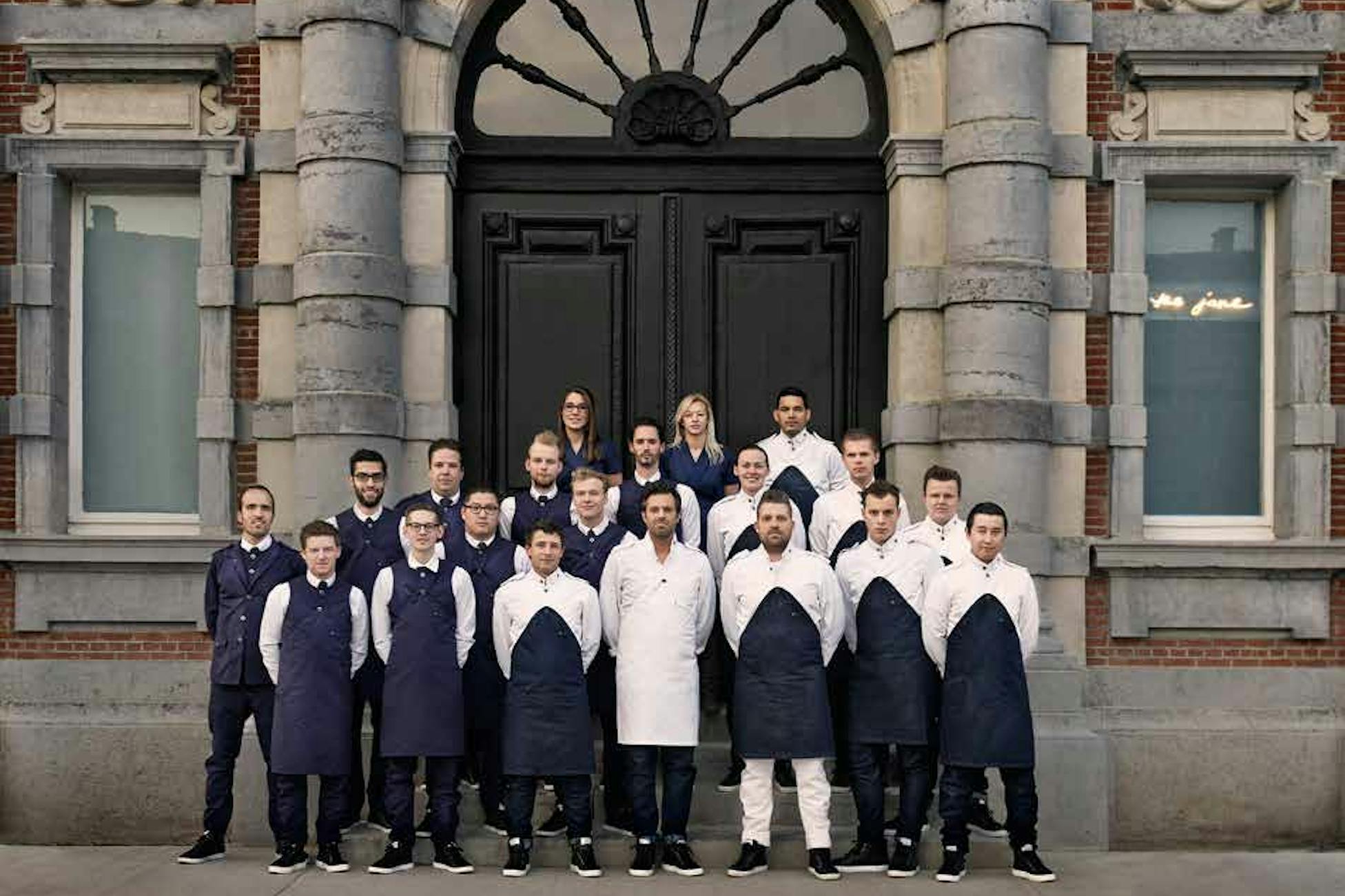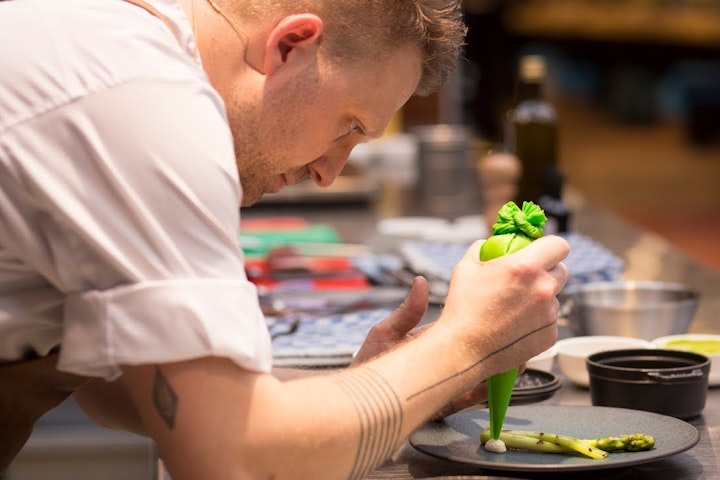For Nick Bril, top chef of the newly opened star restaurant The Jane, the passion for cooking started with an unusual cause. At the age of 14, he had managed to saddle one of his friends with a broken moped, which, of course, he had to pay back. He took matters into his own hands and took a job as a dishwasher in a local brasserie. He was immediately sucked into that somewhat strange world of hard work combined with the obligatory beer afterwards. One day, when he had to help his chef out because someone in the kitchen had failed to show up, he got the bug. Inspired by a colleague who was studying at the famous Bruges school ‘Ter Groene Poorte’, he signed up, with a ‘fifty-fifty’ co-financing from his then-boss, for a story that is still very much alive.
Were you immediately one of the standouts in Bruges?
‘In the beginning, it was difficult. Of course, you want to prove yourself. The boarding school was an expensive business, not only for the manager who made the investment but also for my single mother. But boarding school life was quite disappointing in the beginning. As a 17-year-old who was eager to get out into the world, I had to share a room with boys who were sometimes three or four years younger. At 23h the lights went out. It was all pretty strict.’
‘But I could immediately do a number of work placements in various starred restaurants, including at the Librije in Zwolle. There, I learned very quickly and felt that this was really my thing. The combination of food and art suited me. I also liked the tension that always comes with it. Will the customer like it or not? There is never a second chance, it’s either on or off.’
When I started at Oud Sluis I thought I was actually very good already.
How did you end up with Sergio Herman in Oud Sluis?
‘A friend of mine spoke highly of Sergio, who at the time already had two stars. Despite the fact that I could start in Zwolle, I chose to start in Oud Sluis immediately after my training. I was living in Terneuzen at the time and compared to Zwolle, Sluis was on my doorstep.’
What were those first weeks and months like?
‘It wasn’t easy. I actually thought I was very good on my own… But I ended up as the only Dutchman in a team of Belgians. Things were also very hectic. In the first four months, I had a terrible time. I was constantly forced to face the facts. Until then, I had actually always been very successful and then this happened… During that period, I also regularly thought about quitting.’
What was the big difference between the two?
‘Sergio’s working method and that of the Librije were completely different. In Oud Sluis, we worked with a smaller ‘power team’ to achieve better performances. To give you an example. In Zwolle, we worked with twelve cooks, in Oud Sluis with four. The typical Zeeland/West Flanders SME mentality may have played a part, but it did work.’
What made you stay?
‘After those first four months, I got more and more into the swing of things and was totally absorbed in the dynamic. We were very successful then. There were many awards and the third star followed quickly. The kitchen also grew steadily from four cooks to ten in about three years’ time, I think. In the final period of Oud Sluis, there were up to 22 cooks.’
Have you stayed with Oud Sluis all this time?
‘No, after three years I suddenly had the opportunity to work at Noma in Copenhagen. I then chose another option and became the chef of a Bib Gourmand restaurant in Amsterdam. I stayed there for about a year and learned a lot about ‘managing’ such a restaurant. I learned to make calculations and to deal with people. Very interesting, but one day Sergio wanted me back as his right-hand man. He called it ‘the kitchen chef’ at the time.’
How did that work out?
‘That was quite a challenge too. I had to lead friends with whom I had worked before. Among others Syrco, who is now the chef at Pure C. That was very difficult and also a bit of a struggle. Sergio and I became very close during that period. It also gave me the opportunity to grow further. That job was very different from all my previous ones. You have to pay much more attention to the psychological aspect because you are also working with a larger team. It was also then that the entrepreneur in me grew. However, taking over Oud Sluis was not an option. We were at such a high level that it would have been impossible to become even more successful. You have to allow that to happen. If I did things differently, people would say: “It’s not like the old days with Sergio”. If I continued to follow Sergio’s line, people would say: “it’s just a copy-paste without any of my own input”. I didn’t want to take that risk, so I decided to do it together… (laughs)’
How did the story of The Jane come about?
‘First, there was a pop-up restaurant called ‘La Chapelle’. That’s why we started with that project name. But we thought we should have a name of our own.’
How did you come up with that name?
‘We wanted something that was soft, sexy and tough at the same time. We thought ‘Jane’ had something to it. Sergio came back from New York and had stayed in ‘The Standard’. He then came up with the suggestion to put “The” in front of it. Thus, “The Jane” was born. Later we found out that there is also a hotel with that name in Manhattan.’
What do you remember from your very first conversation with Sergio?
‘My very first conversation with Sergio must have been at a bar in Sluis. With one beer too many, I was practically extolling him (laughs). From the first real job interview, I mainly remember his simple and direct ‘boom-boom’ style. Before I actually started, I had to call him ten times because he always didn’t have time… (laughs)’
What are your biggest differences?
‘Sergio is an entrepreneur at heart, very media-savvy too. A country boy whose mind is in the city. I am less of a country boy. I’ve moved too often for that. Our strength is that we keep our eyes open for the things that happen around us, but at the same time we keep our Zeeland accent.’
What are your ambitions for the future?
‘In 2015 we mainly want to stabilise. Keeping the peace, moulding a good team in an optimal atmosphere. After all, 42 people work together here, so that is really important. In 2016 we want to take a few steps forward again. At the moment, we are faced with the positive problem that we have too few places. A second business in Antwerp or perhaps something abroad… Something smaller is also a possibility… But everything depends on finding good people. You mustn’t want to go too fast. There always has to be a good balance. Sergio and I both love Ibiza. He for the peace and quiet and I more for the clubs. Starting a new business there would be great. What would also be nice is to start a business in a metropolis like New York, London or Paris. To be able to work from your concept and the food and not from the hype and fame that we will always have here. But that seems more like something for ten years from now.’
Are there other chefs you look up to?
‘Ren Redzepi from Noma. What he does is phenomenal. He has been in Tokyo in Japan for six weeks now. He has moved his whole team to the Mandarin Oriental Hotel and brings his dishes there, but completely adapted to the Japanese style. I hear he gets a lot of praise. Even during his stay, he does not work with a fixed menu but continues to vary his dishes. I think that is very punishing.’
Maybe a cheesy question, but what is your favourite dish?
‘I don’t really have one dish. I am a fan of Asian cuisine, though. Always surprising and very often real taste bombs.’
What is your favourite wine or drink?
‘I like to drink a nice white Meursault or Bourgogne that is in balance. I also like the new beer culture. It can be very gastronomic, by the way. If I had to choose one, I would go for a Geuze because of its acidity. Or a Mikkeller from Denmark. Very sour with blackcurrants, but very tasty.’
What is your favourite restaurant?
‘We do not eat out much in the way of gastronomy. Of course, we do a lot of Asian cuisines. But if I have to choose one, I go for Bistrot du Nord in Antwerp. I would also like to visit L’Air du temps in a French village in the future. I hear a lot of good things about it.’
Is there music playing in your kitchen, or is that not conducive to concentration and communication?
‘The music is pretty loud in our kitchen. We have a resident DJ. In the afternoon we do some lounge and jazz. In the evening, we want to create more of a club atmosphere. Not to lull people to sleep, but to make them want to leave. Hakkasan in London inspired us in that respect. Be careful. Not everyone likes it. But for us, it’s just that uplifting feeling that we wanted. That’s why we have theme nights once a month. I play together with a befriended deejay and we serve ‘bites’. Ideal for people who want to go out into the world afterwards.’
‘Deejaying’ has really taken an important place in your life?
‘Definitely! It has become a real passion. I’ve been doing it for about two and a half years now, and it’s the only time I can really relax and not feel the pressure of thinking about my 1200 e-mails.’
Are there any other things besides music that bring you peace?
‘Yes, my daughter and my girlfriend. I also like to travel. But even when travelling I am quite active. I have just returned from 5 days of kite surfing. Not easy, but great. I am also an avid diver. I can’t sit still.’
What does a normal working day look like for Nick Bril?
‘I start at 8.30 in the morning and my ‘day’ ends between 3 and 4 in the morning. That’s five days in THE JANE week. I have one day on which I do my administration and one day off. Four times a year I go on holiday. In total I have seven weeks leave. Quite normal actually. I realise that I have too little time for my family. But I am a happy person… That is also important.’
What is the best compliment you ever received?
‘That I have a beautiful daughter. (laughs) That is really the most beautiful thing there is. I really mean that. Professionally, it does me a lot when I get compliments from people who have to save a lot of money to come and eat with us. People who can’t do that every day. Compliments from chronically ill people or people who are dying also touch me very deeply. We recently had someone who was in that situation and she told me that we had given her the best day of her life. That brings you right back to the essence…’
Finally: Do people really shout at each other in the kitchen or is that not so bad?
‘The catering industry is a tough world. Anyone who is in that world understands that. You quickly become powerless. There’s no room for discussion. Everything has to happen very quickly. At some point, you have to be able to say ‘bam’. After the service, we spend enough time ‘coaching’. We once had a ‘black Saturday’ here and I can assure you, that is very emotional. But the important thing is that you come out of it stronger.’




